Rachel Alexander's Blog, page 279
February 11, 2019
A First Press of Olives“I am more comfortable with you than I am with myself and I trust you...



“I am more comfortable with you than I am with myself and I trust you implicitly. We said we wanted to know each other in every way possible, did we not?”
~ Aidoneus to Persephone
“A First Press of Olives” by Rachel Alexander
A Hades and Persephone (mostly PWP) One-shot
https://archiveofourown.org/works/17750741
A First Press of Olives - KataChthonia - Greek and Roman Mythology [Archive of Our Own]
mariposakitten:
darantha:
My take on Hades (and Cerberus) for...

My take on Hades (and Cerberus) for this week’s Patreon sketchpoll,
I’ve always found him pretty interesting, what with how the ancient greeks viewed him, but also how he was connected to material wealth such as precious metals. Poor deathgods, always demonised in media.
I remembered your background for Apollo and Artemis. So does Artemis know that Apollo is in love with her?
Yes. To her extreme chagrin.
asphodelon:
A one of a kind illustration I did for...
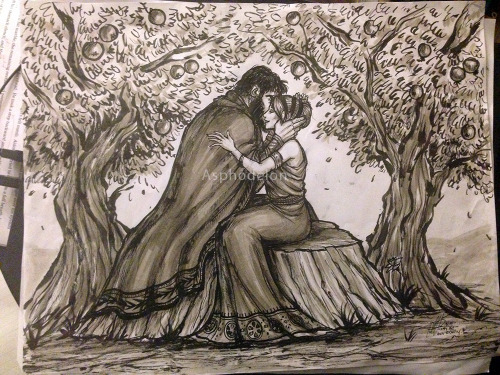
A one of a kind illustration I did for kata-chthonia’s first anniversary. and because she was nice enough to let me bum on her couch for a week.
kata-chthonia:
pri0r:
Fake show poster for Receiver of...

Fake show poster for Receiver of Many by Kata Chthonia
I saw that kata-chthonia had mentioned how cool it would be to get the George R.R. Martin treatment with her amazing take on the story of Hades and Persephone. So to celebrate the impending final chapter, I’ve started to make some fake HBO-style posters for her.
This one is for Demeter, though the scale is a bit odd. It’s supposed to be her walking through the frozen wasteland she’s created in spite of the Olympians and the mortals that worship them~
Holy crap!!!! This is incredible :D
How would Hera react if someone walked in on her and Zeus? Feel like Zeus wouldn't care one bit but Hera would be furious.

Pretty much.
February 10, 2019
waylandsforge:
The xiphos (Greek: (το) ξίφος) is a...
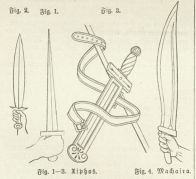
The xiphos (Greek: (το) ξίφος) is a double-edged, single-hand sword used by the ancient Greeks. It was a secondary battlefield weapon for the Greek armies after the spear or javelin. The classic blade was generally about 50–60 cm long, although the Spartans supposedly started to use blades as short as 30 cm around the era of the Greco-Persian Wars. The xiphos sometimes has a midrib, or is diamond or lenticular in cross-section. It was generally hung from a baldric under the left arm. The xiphos was generally used only when the spear was discarded for close combat. Very few xiphoi seem to have survived; photos of some of these can be found via the footnotes.
Stone's Glossary has the xiphos being a name used by Homer for a sword. The entry in the book says that the sword had a double-edged blade widest at about two-thirds of its length from the point, and ending in a very long point. The name xiphos apparently means something in the way of “penetrating light” according to researcher and swordsmith Peter Johnsson.
The xiphos’ leaf shaped design lent itself to both cutting and thrusting. The design has most likely been in existence since the appearance of the first swords. Blades in bronze and iron are suitable for a leaf shape due to the softness of the metals in comparison to steel. Bronze swords are cast and are thus are more easily formed into a leaf shape than iron swords, which need to be forged. (Wrought iron is too soft to make a good sword, but many swords were still made in part or total from wrought iron.)
The early xiphos was a bronze sword. In the classical period it would have been made of iron. The early Celtic La Tène short sword, contemporary with the xiphos, had a virtually identical blade design as the xiphos.
The leaf-shaped short swords were not limited to Greece, as mentioned, but can be found throughout Europe in the late Bronze Age under various names. Bronze leaf-shaped swords from as early as the late second millennium still survive. The Urnfield culture is associated with the use of the leaf shaped bronze short sword. It is generally thought that iron swords had replaced bronze swords by the early La Tène culture about 500BC. During the Halstatt culture a mixture of bronze and iron swords seem to have existed side by side. Iron tends to become severely oxidized (rusted) over the years, and few iron swords have survived, in contrast to bronze and bronze swords that age very well. Thus, much is known regarding the sword during the Bronze Age but less so in the early Iron Age. Bronze thrusting swords from the second millennium still exist in excellent condition.
The Mycenaean form of the word is attested in the dual, as qi-si-pe-e.
A relation to Arabic saifun and Egyptian sēfet has been suggested, although this does not explain the presence of a labiovelar in Mycenaean. One suggestion connects Ossetic äxsirf "sickle", which would point to a virtual Indo-European *kwsibhro-.
Basic Roman Sword Types
Note: “Gladius” was a term used by the Romans for all swords, but for this post it shall only be used to describe the common Roman short swords.
Xiphos: 8th century BC - 2nd century BC: Invented by the Greeks and commonly used by Greek, Macedonian, Roman, Carthaginian,and Etruscan hoplites. Phased out in favor of the gladius after the 2nd Punic War.
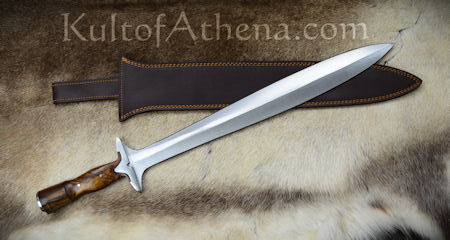
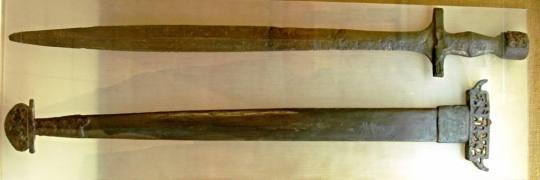
The Gladii
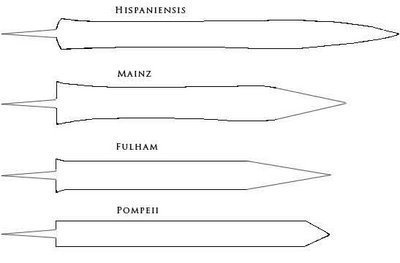
Gladius Hispaniesis (Spanish sword): 216 BC - 20 BC, Adopted after the Second Punic War, originally used by Celtic mercenaries who allied with the Carthaginians.
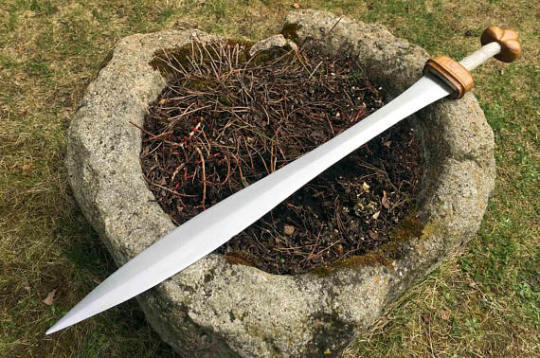
Mainz Type: Late 1st century BC - 4th Century AD. Manufactured in military camps around the Mainz region. Most examples are found around the Roman - German frontiers around the Rhine and Danube.
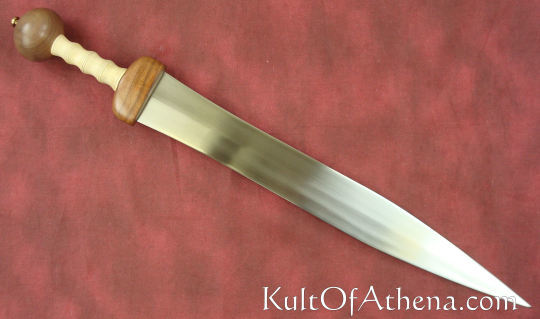
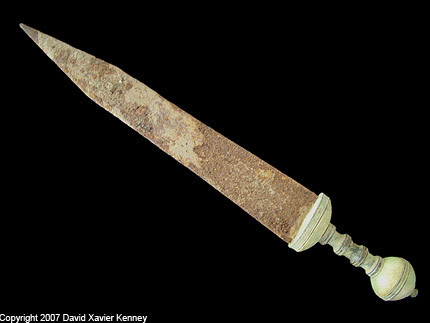
Fulham Type: 1st century AD - 4th century AD, First examples discovered in the Thames River near Fulham (England). Considered to be an evolutionary conjunction point between the Mainz and Pompeii Type.
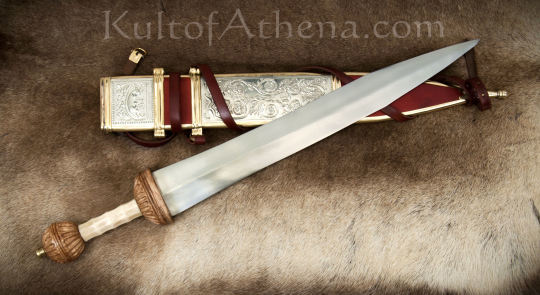
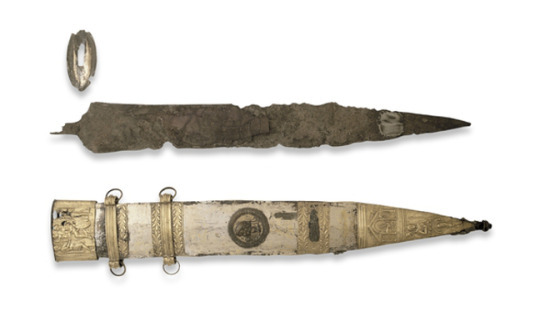
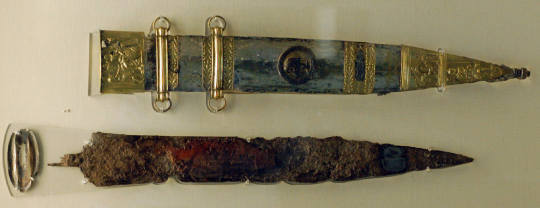
Pompeii Type: 1st century AD - 4th century AD: Named after the city of Pompeii, the most common and popular type of gladius.
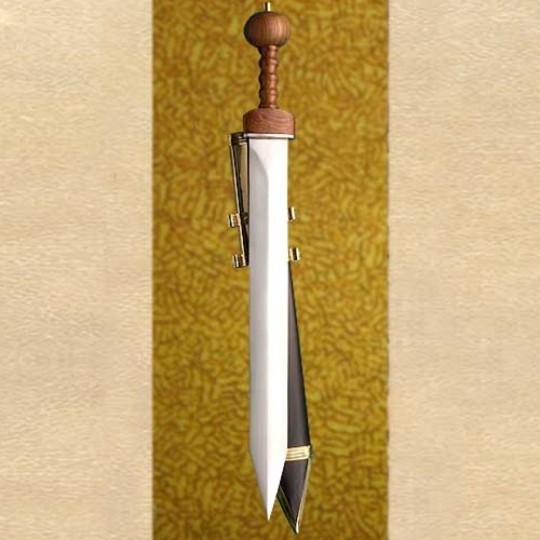
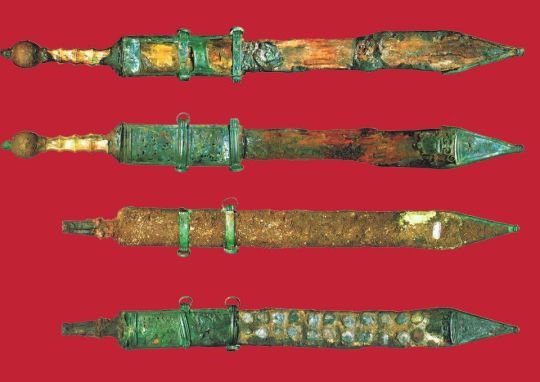
Spatha: 1st century AD - 5th century AD. Longsword that originated from the Celts and was used by auxiliary cavalry. Replaced the gladius as the primary heavy infantry sword after the 3rd century. Infantry versions had sharper point and balance point near hilt for better stabbing, cavalry versions had a more rounded point and point of balance farther along the blade for better slashing. Continued in use after the fall of the Western Roman Empire and later evolved into early Medieval swords such as the Carolingian sword (AKA Viking sword).
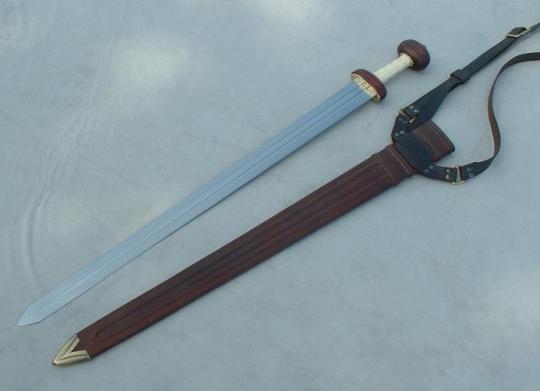
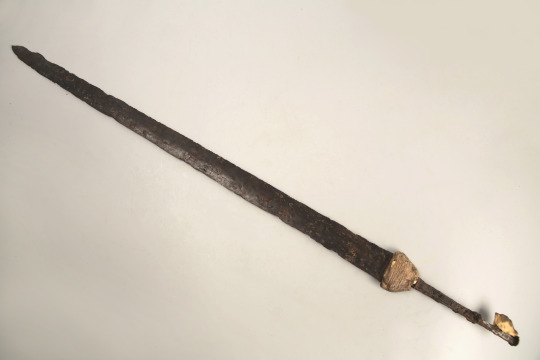
Semi Spatha: (4th century AD to 5th century AD) Shortened version of the Spatha, or an elongated version of the Pompeii Gladius.
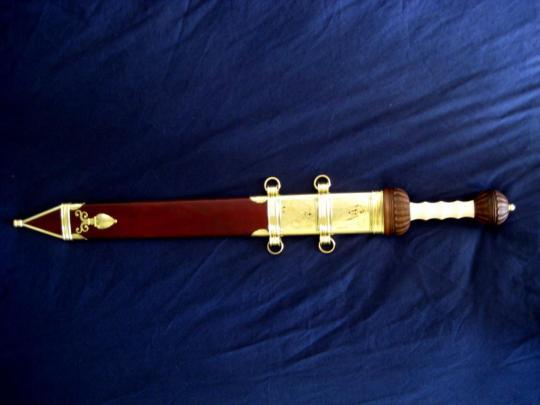

No you wouldn’t. I promise you Just ask @asphodelon @lonerico and my husband.

No you wouldn’t. I promise you Just ask @asphodelon @lonerico and my husband.
Director's cut for hades and persephone training in RoM! Love love love your work!
I loved and hated writing this scene. So very much. I probably went through at least eight articles about the very quick leaf-shaped singled-handed xiphos sword and how it was used in combat, and watched historical fight choreographers on YouTube to get the motions right. Most cinematic fight choreography relies very heavily on wu shu, and though I respect that style a lot, I didn’t want to use that modality.
A few things needed to happen in this scene. First off, I wanted to showcase how things had changed between them in the month of time that had elapsed since their fight and reconciliation. Second, I wanted it to be within the context that Aidoneus laid out for Persephone when he agreed to take her to Tartarus. She would have to be ready. And Thirdly, I needed to get them into a scene that would make Hermes cringe from here to eternity for the rest of forever.
Bronze against bronze, their swords clashed. The echoes rang off the walls of the courtyard atrium. Gray morning mist and the golden poplar tree hung overhead. Aidoneus fought her back until she retreated, panting. They stared intently at each other. He gave her the signal to advance and held his sword aloft, coiling back and light on his feet as she swept her blade at him.
This was a fun way to set the scene. I didn’t want the lesson to take place in a liminal space. I wanted to be there. What would be the first thing you’d notice besides the visual? Sound? Probably. Scent? Of mist and stone and sweat. And then I dropped the reader into the action.
He swung his sword down in a hard arc as he spun aside, knocking the weapon from her hand. It skittered across the cobblestones. Persephone stumbled forward and Aidon swept gracefully around her, capturing her from behind with his arm. He held Persephone by the silver cuirass that bound a short tunic to her body. The edge of his blade sang through the air, stopping a safe distance from her neck. They held there, motionless.
“How did I beat you?”
I wanted to make sure the reader knew that Aidon was NOT at all fucking around. That he took this seriously. That this was what he would often say after he won a round. And I wanted to make it clear that he won most rounds. I wanted to give Persephone a similar though slightly different costume than Aidoneus. Silver seemed more in line with her coloring. Also to note, that even though I did all the research and choreography, my husband’s editting was what really tightened the language here. He’s much better when it comes to writing violence. When I finally write Titanomachy it will be co-written by him, I’m fairly certain.
“I forgot my footing,” she said, feeling his chest rise and fall behind her. He relaxed his blade back to his side, but his left arm still bound her to him intimately. She felt his breath against the back of her ear, her hairs standing on end.
“And what was one of the first lessons I taught you a month ago?” he said, his fingers sliding up her neck over the slick sheen of sweat until he felt her pulse fluttering under his touch.
I wanted it to be sexy, though. It curls my toes to tread that line between fighting and fucking, and I’m sure it curls the toes of the readers.
“You’re distracting me,” she whispered.
“What did I teach you?” he breathed back into her ear, gently nipping at her earlobe.
“That footing is everything,” Persephone finally answered.
This is straight out of weaponry 101. Sword is a tool. Not the thing that will save you. It only take a pound of pressure to cut through flesh, and only ten pounds to slice bone.
He broke away from her and her body rocked backward at his absence. She watched him walk over to her sword. Aidoneus picked it up by the blade and tossed it to her. “Again.”
Persephone caught the handle and sighed. “We’ve spent two hours on this today.”
“And you’re getting better. Again!”
She wrinkled her nose at him.
“You’re adorable when you give me that look,” he said with a smirk.
I wanted to make sure that it was playful, that they were going through a wide range of emotions within this scene, because at this point they’ve had a month to grow together and learn each other beyond the confines of the bedroom.
She rolled her eyes at him. “Aidon, truly, I’m tired. How long did you practice when you started learning?”
“I trained with Prometheus for ten hours a day, every day, for four years before I ever swung a sword in battle.”
The alleged ten thousand hours before you master a discipline.
“What?!”
“Don’t worry, my love— only another war among the gods could force you to learn as I did,” he said. Their swordplay in the courtyard was a peacetime dance, a game— basic defensive movements and nothing more. He prayed she would never hear a warrior boast of his courage at dawn, then plead for his life before noon. He prayed she would never see the sun set on a battlefield blackened by crows.
Aidoneus pretty much has PTSD. He is constantly bombarded by intrusive thoughts relating to the Titanomachy even though an incomprehensible amount of time has passed since it took place.
“Could I defend myself in Tartarus?”
“You could defend yourself if we were momentarily separated, or if the Keres don’t recognize you.”
Here’s where I hung a Chekov’s gun on the wall for what happens to them in Tartarus.
“What if a shade got loose?”
“The shades in Tartarus aren’t chained. Their minds are their prisons; their eternal punishments are their bonds.”
Hung another Chekov’s gun here for Sisyphus.
“What about one of the Titans?”
“Then we would both be in danger. No matter how many thousands of years I’ve spent mastering this,” he said, flourishing his blade, “it would take all the immortals above and below to stop them.”
“Then everything you have taught me, though I’m glad to have learned it, and to have you as my teacher,” she said with a shy smile, “is completely futile.”
“It’s not futile, sweet one. And worry not. The world itself would break apart before the Titans’ chains came loose. I’m teaching you to make sure you’re not defenseless down there. I held no expectations that you would master this within a month.”
And the third and final Chekov’s gun for when Aidoneus has to let Persephone go back, knowing that if he keeps her and the world weakens further that it will be the end of them, of Chthonia, of Olympus, of mankind. The world is breaking apart. In the chronology of this, Persephone goes back in less than a week’s time.
“Someday,” she said.
“Perhaps,” he grinned.
Persephone knew her movements were still clumsy and slow. He’d begun by teaching her to reshape her peplos into armor, and the silver cuirass she’d chosen now hung heavily on her shoulders by its leather straps. She bent over and exhaled, trying to roll her spine as she came up, feeling tension in her arms and the back of her legs. After a month of practicing, she now knew why her husband had such perfectly sculpted calves and thighs.
“Come; one last time for today, Persephone. Afterward I’ll show you something.”
“Show me what?” she said, rotating her shoulders to stretch out the kinks in her back. Persephone fell into the sidelong stance he’d taught her.
His smirk grew deeper, his eyes echoing the feral look he got when they were in the midst of sparring… and other times. “It’s a surprise.”
She bit the corner of her lip and smiled, trying to read his face. “I wouldn’t call that a surprise anymore, Aidon. A month ago, yes, but—”
“It’s not what you think,” he said in mock innocence. “But I certainly won’t complain if it turns into that.”
She sighed, happily defeated. “Last time?” “I promise. Come, wife.”
I love flirty, entendre-filled, insinuating fluff. I’m glad everyone indulges me when I write it.
Persephone rocked from her heels to the balls of her feet, determined to keep her footing this time. Her legs corded against the straps of her sandals and she advanced. He knocked her sword aside. She sidestepped and ducked backward to avoid his riposte.
“Good!” He called out, returning to his stance.
This particular scene was the 100 words here that took me six hours to research. Terminology, making the choreography make sense, and still making it a flirtation.
She circled him this time, locking her eyes to his as she waited for his attack.
“Remember what I told you. Look to the shoulders and the chest to gauge movement; never the eyes. Eyes can lie; sinews do not,” he said, pushing forward. She met his sword and pushed it away, knowing that his movements were slowed so she could learn, his true strength held in check so she wouldn’t be injured.
“But your shoulders and chest, husband…” she said, stabbing at him, “…tend to distract.”
She knows he’s dialed it back for her to about 50%. I like the idea of him teaching her about the Underworld… that’s been his role in large part up to this point anyway, but never in a condescending way.
He laughed and parried, locking the hilt of his sword against hers and pushing her away. Persephone rolled back and came up on one knee, blocking his downward swing, the blades scraping together loudly. She wheeled around and swung at him with her riposte. His eyes widened as he retreated from her barrage of swift strokes, blocking one after another, until she accidentally left her left side open to him.
His sword curved over her, its tip angling down toward her shoulder as he stopped his retreat. Neither moved. They stood close enough that the heat of her breath left a trail of mist on his armor, and she could feel him panting hard against the intricate coronet of braids Merope had piled on top of her head that morning.
My husband had a heavy hand in making this scene work. I had set up the basics of the choreography, and he helped me tool the language just right. I wanted to show that they stopped or yielded with immense precision, so that they push each to the limit without injuring each other. And by mentioning Merope and Persephone’s hairstyle, I wanted to show a slight change in how their routines are set up. Persephone is comfortable with having attendants because in her prepubescent days she was surrounded by nymphs.
“How did I beat you this time?”
She smiled up at him, glad that Aidoneus never just let her win and took this as seriously as she did. But he’d forgotten where her sword lay.
“You didn’t,” she said. “How did I beat you?”
My favorite line. Because the audience and Aidoneus are expecting this to be another round of ha-ha-gotcha because he is simply more experienced and a larger physical presence than she is.
He raised an eyebrow. “Well, wife, that’s a… curious question. Considering that the next move from this sword would be through your neck.”
“Indeed, husband,” she breathed. “But my blade would have cut into your leg before you had a chance to bring yours down on me.”
Aidoneus looked at her quizzically, then lowered his sword and leaned away from her. Sure enough, the flat of her blade lay against the interior of his thigh. If they were mortal, her cut would have sliced tendons and opened veins and collapsed him to the ground before he’d even begun his swing. She’d used her stature to her advantage.
She didn’t win by being the stronger or more experienced opponent, or by size or skill, but by strategy. And Aidon is pretty much heart eyes after this.
A smile slowly decorated Hades’s face. His sword clattered to the ground, and she carefully withdrew hers. He stepped toward her as her blade followed his onto the stone floor. When his hand cupped the nape of her neck, their clothing started to shift, the armor softening around them. By the time his lips met hers, they were once again draped in their familiar spun wool robes.
Ok, so confession time, I can’t wait to see how they do transitions like this when the TV series gets made.
He led her all the way to the courtyard gate. When she felt the cold press of the stone wall at her back and her husband’s warm body in front of her, she wished there was no cloth barrier there at all.
“My fierce little warrior wife,” he whispered against her lips.
She had to laugh. “Oh, now you’re just having fun at my expense! You make it look so easy, you move so slowly to accommodate me and here I am hacking away…”
“How else will you learn?”
“Well, how did you learn? Did someone go easy on you?”
In an instant, Aidoneus’s mind was on remote Thera and his first violent lessons with Prometheus. He grew silent and looked across the courtyard.
I had to delete a scene from the book in order to keep the scene’s cohesion and make the final page count for Receiver of Many. I assure you that the scene will appear again when I write Titanomachy, but for the time being here it is:
“Get up!” his teacher said in his clear voice.
He lay sprawled at the base of a cliff, the wind knocked out of him. He curled forward, groping around in the dust for his sword.
“How much pity do you think your father will take on you? Or my father for that matter?” Prometheus circled him, the sun beating down on them. It was always so bright now that Aidon was free— always blinding him. “Iapetos would have put his spear halfway into the rocks behind you and skewered you like a pig by now.”
“He’s not here…” a younger Aidoneus finally choked out.
“No, he’s not,” Prometheus said, slamming a sandaled foot into his gut. “But I am.”
Aidoneus crumpled forward then coughed again, rocking on the ground before staggering up onto his feet with a growl, sword in hand, his jaw clenched.
The rebel Titan smiled at him. “Oh, now you’ve decided you’re angry. Good! Use it.”
Wild eyed and yelling, Aidoneus rushed at him, bringing the edge of the blade down in fast, hard strokes, each one blocked handily by Prometheus’ sword. Finally, he tangled his teacher’s blade at the hilt and wrenched it clear of them, a cloud of dust drifting away on the salty ocean breeze where it landed. He pointed his blade at Prometheus’ neck. The Titan smirked at him. Aidoneus breathed through gritted teeth and wiped the sweat and dirt off his brow through a mess of uneven black curls— hair that he’d sawed off to the quick with a knife six months before. “Enough already!”
“Not even close,” Prometheus said, calmly.
“You think I enjoyed being trapped in there?! That I’m not already angry enough?! My entire wretched life has been—”
“No, I don’t think you’re angry enough. Not nearly. If you were, you’d be able to take it and mold it into something useful. This,” he said, deftly reaching forward and plucking Aidon’s blade right out of his hand before twirling it in front of him, “is your salvation. It is the instrument by which I’m going to turn you into a warrior— a leader of men, and one day the king of the gods.”
“What?!” Aidon spat incredulously.
“Well, what did you think this was all about? You think we freed you and the others for sport? Why would Metis and the rest of us risk everything for the Children of Kronos? If by some Fates-granted miracle we aren’t all thrown into the depths of Tartarus,” he said, “if this rebellion actually succeeds, if the Tyrant is toppled— and that is a long list of ifs, Aidoneus— who do you think they’ll look to? You are the heir! The firstborn…”
And now we return to present time. It was fun to write when I wrote it, I was jarring to read when I did the final draft. There are two following flashback scenes to just after the Titanomachy, when Nyx gives Aidoneus the Key of Hades, and later when Thanatos tells him to quit throwing himself a pity party for one. I decided that we didn’t need this scene as well to flesh out how Aidon became the King of the Dead instead of the King of the Gods.
“Aidon?” Persephone said, shaking him out of his memory. He looked around before focusing on her inquisitive face and smiling thinly, trying to remember her question.
“No, sweet one, he never went easy on me,” he finally answered. “But those were different times.” He smiled at Persephone and trapped her within his arms again, kissing her neck. His head bent lower and he felt her wince. Aidon stepped away from her. “I’m not hurting you, am I?”
She rolled her neck. “No, I’m just sore.”
He smiled. “Well, then this might be the perfect time to unveil the surprise I promised you.”
And scene, and off to the grotto pool for sexy times.
Thank you for asking about this particular scene, anon. I had fun explaining it.



